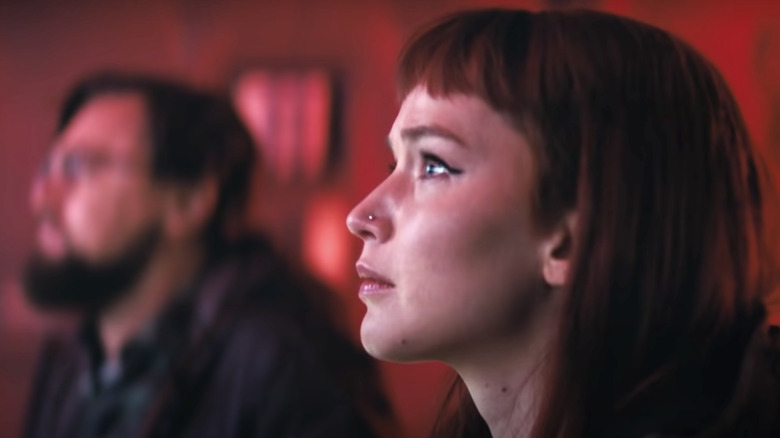The setup of the movie Don’t Look Up is recognizable enough: Two low-level astronomers (played by Jennifer Lawrence and Leonardo DiCaprio) discover a comet which they predict will hit the earth in six months, destroying all life on the planet unless it is deflected. So they try and warn the world, firstly in a much postponed meeting with the US President (played by Meryl Streep) and then through the media, but their naïve communications approach sets up doubt on the validity of their findings.
Writer-director Adam McKay wanted to produce this comedy as an allegory on climate denialism. And the first part of the movie delivers the premise with a balance of drama and fun. Watching as the two scientists’ warnings are not taken seriously is both amusing and terrifying at the same time. Unfortunately, it is around this point where the story starts to lose focus.
Part of why this happens is explained by screenwriting guru, Blake Snyder, who had a rule he called ‘No Double Mumbo Jumbo’. That meant an audience could suspend belief and accept one piece of ‘magic’ in a story but not a second. The first piece of magic in Don’t Look Up is that a comet is about to destroy the earth. But, McKay adds a second [spoiler alert]: that the comet is composed of trillions of dollars of rare minerals that can be exploited by a tech entrepreneur, while reducing its threat to earth.
As a result, the plot takes a detour and more clichéd characters are introduced including the MAGA-inspired crowd refusing to “Look Up” to see the comet in the night sky. Rather than adding depth to the story, most of these complications merely make the story longer and shallower. Sure, it’s a dramedy and not meant to be subtle, but the sheer number of blunt caricatures is overwhelming.
That’s not to say there aren’t funny moments and memorable scenes. Cate Blanchett’s performance as a show host is outstanding, and Jennifer Lawrence is consistent throughout. But they’re not enough to compensate for the flaws in the story telling. A less ambitious plot with more focus on the Lawrence and DiCaprio character journeys could have at least made us care for them more. As it is, only Jennifer Lawrence’s character evokes any semblance of empathy. The rest we hardly care about. I’m not sure that’s the feeling a filmmaker wants to leave with his audience after they watch an end-of-the–world movie, even if it is a comedy.
I had high expectations for Don’t Look Up. What I found was a film that was noble in its intent and message, but – as a film – let down by its execution.
Since its release in December 2021, Don’t Look Up has been one of the most viewed movies on Netflix. Let’s hope that, at the very least, it is a catalyst that starts constructive conversations between viewers about climate change.
The reviewer is the co-author of Court of the Grandchildren, a novel set in 2050s America.
